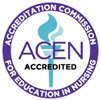Bachelor’s Degrees in Science in Nursing


Credits
122
Duration
3 years
Following the curricular sequence
The Bachelor’s Degree in Science in Nursing trains students in the development of the knowledge and skills of the profession related to human care and teaching with a holistic approach. Graduates of this program will be able to apply the competences of leadership, management, critical thinking, assertive communication, and ethical and legal decision making, specific to the different needs of groups, populations and situations. In addition, students will employ their skills in the clinical and biopsychosocial aspects during their intervention with clients, families and the community, therefore contributing to the betterment and development of the quality of life in the society.
Outstanding Courses
- Psychology
- Research In Nursing
- Leadership And Management
- Nursing Interventions With Adult And Elder
- Nursing Intervention in Mother and Newborn “
Programmatic Accreditation

Accreditation Commission for Education in Nursing*
Possible Employment Opportunities
- Hospitals (private and government owned)
- Medical offices
- Homes for the elderly
- Hospital educators (private and government owned)
- Educators in universities and technological colleges
- Nurses in private industries and companies
License or related Certification
Upon graduation, students are required to take the licensing examination to obtain the generalist nurse license issued by the Puerto Rico Board of Nurse Examiners.
Locations
- Online
Program Competencies
Graduates of this program will be able to:
- Act independently, with particular attention to leadership, administration, and research in any healthcare scenario within the ethical and legal limits and scope of practice of the nursing professional in Puerto Rico.
- Develop verbal, non-verbal, written or electronic communication with the client, family, community, and multidisciplinary health team to achieve results in the provided care.
- Holistically implement decision making in the phases of the nursing process to promote, maintain, and re-establish the wellbeing of the client, family, and community.
- Integrate innovative technological advances in research as well as evidence-based practice to improve care for the client, family, and community.
- Analyze the types of health informatics to develop and manage nursing care plans to improve the health of the client, family, and community.
- Evaluate the implications of ethical and legal issues when providing healthcare, following professional ethical canons and the laws regulating nursing practice in Puerto Rico.
- Value individual singularity, cultural diversity, and human responses when selecting holistic nursing interventions.
*The associate and baccalaureate (including the RN to BSN option) nursing programs at NUC University at the Bayamón (including online), Arecibo, Caguas, Escorial, Mayagüez, Ponce and Río Grande campuses and the Columbia Central University Bayamón and Caguas campuses are accredited by the:
Accreditation Commission for Education in Nursing (ACEN)
3390 Peachtree Ro
Phone: 404-975-5000, web site: https://www.acenursing.org
The most recent accreditation decision made by the ACEN Board of Commissioners for the associate and baccalaureate nursing programs is continuing accreditation.





